Tough Love
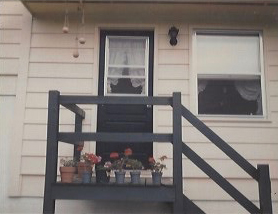
Fifty years ago, I was sitting on the back stoop of our house on Park Road in Crozet when the sound of shattering glass pierced the stillness of a summer night. I looked across the side yard at my neighbor’s home. His storm door’s broken pane glinted in the moonlight. A volley of angry shouts came from inside.
Maynard’s drunk again, I thought.
I stared at the house uneasily. Maynard was a binge drinker, sober for long stretches, then blind drunk for days on end. Lately, his binges had become violent. He drove his fist through his bedroom wall a few months ago. Busted up a coffee table during the last one. Now the storm door. I worried that his whiskey-rage might escalate to attacks on his wife, Birdie, or their two little boys.
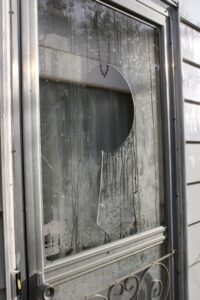
There was more shouting, much louder than the first round.
Cursing under my breath, I stepped down off the stoop and walked over to their carport. The house was quiet by the time I reached the storm door and looked inside.
The kitchen/family room was a small rectangular box, the sink and appliances to the right of the door, a sitting area and television to the left, the kitchen table across the room. Maynard and Birdie sat side by side at the table, facing me, their backs against the far wall. They were in their thirties. He was average height, built like a tree stump with a round bald head and thick red eyebrows that came together over his nose. Birdie was as stocky as Maynard with a peroxide blonde bee-hive and a double chin.
“You guys all right?” I said.
“Come on in and see for yourself,” Birdie said.
I opened the storm door carefully so as not to get cut and stepped inside.
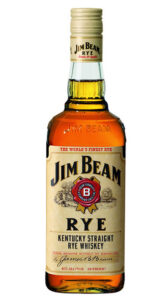 Maynard was shirtless. His arm rested on the table in a pool of blood, a deep wound on the meaty inside of his forearm running from his wrist to his elbow, a half-empty bottle of Jim Beam beside it. In Maynard’s other hand he held a shotgun, its butt propped on his thigh, the barrel pointed toward the ceiling.
Maynard was shirtless. His arm rested on the table in a pool of blood, a deep wound on the meaty inside of his forearm running from his wrist to his elbow, a half-empty bottle of Jim Beam beside it. In Maynard’s other hand he held a shotgun, its butt propped on his thigh, the barrel pointed toward the ceiling.
The two little boys, eight and ten, stubby little replicas of their parents, sat cross-legged on the floor in front of the television, staring wide-eyed at Maynard.
Smirking, Birdie took a deep drag on a Marlboro and casually blew smoke across the room. “Rammed his fist through the storm door,” she said. “Damned near cut his arm off so’s he could show me what a big man he is.”
“Shut the hell up,” Maynard said. He lifted the shotgun off his thigh with one hand and placed the mouth of the barrel under Birdie’s chin.
Her blue eyes widened. “What you doin, Maynard?” she said softly.
“Fixin to blow your head off.” Maynard shoved the barrel upward hard, banging the back of Birdie’s head against the wall, and cocked the hammer with his thumb.
Birdie winced. “Go ahead,” she said, through clenched teeth. “Pull the trigger you hate me so much.” A tear slid down her cheek.
The boys whimpered.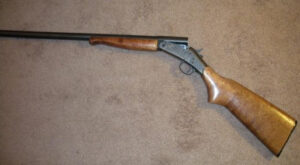
I swallowed hard and took a step toward them. “Maynard. Put the gun down.”
Maynard didn’t look at me. Holding the shotgun tight under Birdie’s chin, he glared at her, his hand steady, the muscles in his face tight as wire.
Scared breathless that a sudden movement might set him off, I crossed the room slowly and stopped on my side of the table. “Don’t do it, Maynard. Please. Think about the boys.”
His angry eyes fixed on Birdie, he didn’t even glance at me.
No one moved, the only sound the boys’ quiet mewling. Five seconds passed. Ten.
A crooked smile crept across Maynard’s face. He lowered the shotgun, propped it against the wall, and took a swig of Jim Beam.
I let out a long breath.
Birdie’s hand trembled as she brought her cigarette to her mouth. Blinking back tears, she French inhaled a cloud of smoke through her nose and blew it out again. “You a piece a work,” she said under her breath.
It took me a full minute to build up the courage to go around the table and get the shotgun. Maynard made no move to stop me, thank God.
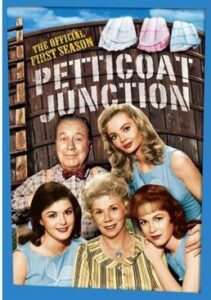 Standing by the sink, I broke open the single-shot twelve gauge with numb hands and clumsily withdrew a shell from its chamber. Number 5 shot, designed for small game, squirrels and rabbits, but powerful enough at point blank range to blow Birdie’s face off. She’d have been brain-dead before her body hit the floor.
Standing by the sink, I broke open the single-shot twelve gauge with numb hands and clumsily withdrew a shell from its chamber. Number 5 shot, designed for small game, squirrels and rabbits, but powerful enough at point blank range to blow Birdie’s face off. She’d have been brain-dead before her body hit the floor.
I put the shell in my pocket and called the rescue squad on the kitchen wall phone. Light-headed and nauseous, I hung the phone on its hook and sat down at the table to pull myself together before I called the police.
The three of us said nothing. Birdie smoked down her Marlboro and lit another. Maynard finished off the whiskey. The edges of the oval-shaped pool of blood under his forearm crept outward across the pine-wood table-top. The boys turned on the television and stared blankly at an episode of Petticoat Junction, its canned background laughter jangling my frayed nerves.
When my hands stopped shaking, I stood and picked up the phone.
“Don’t call the law,” Birdie said.
I looked at her.
“It’s a family matter,” she said. “It’s between me and Maynard. It’s no one else’s business.”
I disagreed. In a determined confident voice, she argued with me for the next five minutes while Maynard stared at the empty bottle and said nothing.
“It don’t involve you,” she said. “Stay out of it. Leave it be.”
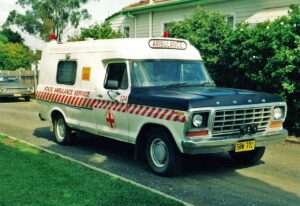 The ambulance pulled up in the driveway.
The ambulance pulled up in the driveway.
“Don’t tell the rescue squad boys,” Birdie said. “Don’t tell the sheriff’s men. Don’t tell nobody.”
The EMTs bandaged Maynard’s wound, marched him out to their van, and drove him to the hospital.
Many of the posts on this blog recount experiences I’m proud of. This is not one of them. I didn’t tell the EMTs what Maynard had done. I didn’t call the police. I didn’t tell anyone except my wife, Cindy.
Most people liked Maynard when he was sober. We told ourselves forgiveness and friendship were the best medicine for his alcoholism, but I knew better. He needed to be hit between the eyes with a two-by-four, “tough love” they call it today, but I didn’t have the strength of character to do it. No one around him did. So he kept right on drinking.

The man put a gun to his wife’s head, and I did nothing. Somehow I rationalized my behavior back then, but as I sit here writing this, I can’t understand it and I’m ashamed.
Cindy and I didn’t mix with Maynard and Birdie after that. Friends back home told me they split up about ten years after we moved away to Charlottesville. If they’re still living today, they’re in their eighties and their sons are pushing sixty. The boys were nice kids. I hope they turned out okay, but it would be a miracle if they did.
In Chapter 18 of The Judas Murders, Deputy Toby Vess opens a broken storm door to find Grover Sipe at his kitchen table pressing a shotgun under his wife’s chin while their two little boys cower in the corner. Toby disarms Grover. Grover’s wife begs him to let Grover off. Toby arrests him, locks him up in the county jail, and calls Social Services to see after Grover’s wife and little boys.
It was a satisfying scene to spin out. I wish I’d written it that way fifty years ago.
Post Script: For obvious reasons, I changed the names of my neighbors in this post and in The Judas Murders.



June 2, 2020 @ 4:14 pm
You are a very good storyteller and I have enjoyed your books and your blogs. Keep em comin’
June 3, 2020 @ 7:54 am
Thanks, Terry. I appreciate your comments and encouragement so much.
June 1, 2020 @ 11:16 am
Wow.….. Quite a story … and sadly, an honest confession.
June 2, 2020 @ 11:18 am
Thanks, Don! Not proud of it but I’d like to think I’d handle it differently today.
May 31, 2020 @ 12:54 pm
Wow! Powerful scene, Ken, and masterful writing. Always a pleasure to read your posts.
June 1, 2020 @ 8:43 am
Thanks, Gay! I appreciate you following my blog.
May 29, 2020 @ 10:45 pm
Thank you for sharing that story ? you’re much braver than I would’ve been just to go over there ! And dealing with that guy with a shotgun you’re a brave Man Ken
May 30, 2020 @ 8:28 am
Thanks, Janet. You are so kind, but I wish I’d been brave enough to take that next step and call the police. If he had done something to Birdie later, living with my inaction would have been tough.
May 29, 2020 @ 9:06 pm
Ken, I very much enjoy reading your writings — you are gifted with a life full of events that lend themselves to be shared. Your early days are a lot like the early times of my life — I grew up in a very poor, disjointed family in Arkansas. Alcohol, mental and physical abuse, prejudice, poverty etc were a part of our lives that sometimes causes us to dig deep in our memories for the good times with family and the simple life of years gone by.
Thanks for sharing your stories and God given talents.
May 30, 2020 @ 8:26 am
Thanks, Steve. Coming from you, this means a lot to me. I have great respect for you and the way you conducted yourself in the business world. It seems we have a lot in common in our backgrounds that made us who we are. Thanks for following my blog!
May 29, 2020 @ 7:04 pm
Ken, I’ve changed names too in my stories, and been ashamed later. But you know what? There are times the names don’t matter, only the fact that abuse and hatred existed, and, for one small moment in time, were resisted and in some small way reported. Its what we humans do. One small step at a time.
May 29, 2020 @ 7:48 pm
Thanks, Jim. It was a long time ago, a harrowing experience. Unfortunately, it repeats itself today in different ways in different places.
May 29, 2020 @ 4:18 pm
I just love these stories; please keep them coming.
May 29, 2020 @ 4:59 pm
Thanks, Tara. I appreciate your encouragement.
May 29, 2020 @ 3:07 pm
Wow!
May 29, 2020 @ 1:02 pm
Oh Ken.…. how powerful today.
May 29, 2020 @ 2:33 pm
Thanks, Cathy!
May 29, 2020 @ 12:42 pm
I don’t think any of us get through life without some serious regrets concerning actions not taken towards others. My mom regretted not calling the authorities when we told her one of our friends was being sexually abused by her dad. I witnessed an old fella getting mugged. The sight of him on the ground being kicked haunts me after 45 years. Why didn’t I check out that strange white van backed up to the neighbor’s garage while they were at work? The fact that these regrets haunt us calls us to action when a similar situation happens again.
May 29, 2020 @ 2:32 pm
Thanks for sharing those incidents, Janet. As this blog post proves, I’m a lot clearer on what I should do in a crisis when I’ve had fifty years to mull it over. It’s really hard to know what to do in the moment.
May 29, 2020 @ 12:42 pm
Wow! I can’t say anything because in a similar situation, no one knows what they will do. I have a cousin who ran from a man that had a shotgun to her daughter’s and grandson’s heads. He killed them both while she ran. I like to think that I’d have done differently but we never know unless we’re in that situation.
May 29, 2020 @ 2:30 pm
That is a tough situation! Must be so hard to live with afterwards. The hardest part of these crises is you don’t have any time to think. You have to react in the moment, and it’s easy to second guess yourself years after it happens.
May 29, 2020 @ 12:07 pm
Love your work Kenny! What a story! You were a brave person and went beyond the call of good neighbors. You showed your wonderful character. You did help. She might have been shot if you had not gone over that evening. Hope you and your loved ones are well. God Bless. Linda Beasley Graham
May 29, 2020 @ 2:27 pm
Thanks, Linda! Thinking about that night for the last fifty years, my feeling now is either you should stay out of something like that altogether, or if you step into it, you have to finish it. Hope you and your loved ones are safe and well, too.
May 29, 2020 @ 11:14 am
Ken. You have led a fascinating life. Thanks for sharing your stories with us.
And you did all you could. Most people would not have had the guts to go check things out. You prevented Maynard from killing Birdie that night. And a terrible trauma for the boys. If you had done anymore, you would have risked that Maynard would have come after you when he got drunk in the future. Sometimes we have to accept that we can’t help people who don’t want to be helped.
May 29, 2020 @ 2:24 pm
Thanks, Lucian. My only excuse for not doing more, and it’s not much of one, is that I didn’t understand the concept of the battered wife syndrome back then. Birdie was in the throes of it, I guess. Anyway, I do a lot better responding to a crisis when I’ve had fifty years to think about my response.
May 29, 2020 @ 11:07 am
Thanks Ken for sharing such a personal incident.
May 29, 2020 @ 2:21 pm
Thanks, Ursula!